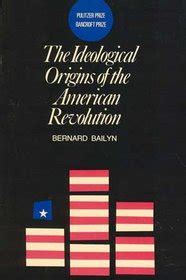
The Ideological Origins of the American Revolution
Harvard University Press, 1967
At the time of this writing our country is 245 years old. The constitution under which we live is 234 years old. It is embarrassing to consider how many people do not realize that the experiment of democracy languished in warfare and then general confusion for eleven years before arriving at a “more perfect union.” It is indeed remarkable, in light of human history, that our republic has stood virtually unchanged in its form all this time. Only one other major country in the world can boast the same during that time and it is that of our old nemesis – the United Kingdom. Such an oddity bears deep consideration. The US and the UK were, in 1776, one country and for all practical purposes shared similar political traditions. The “ideas” that would emerge as the American Revolution were often derived from philosophers and politicians residing in the UK. Those ideas took on a unique aspect when they were subjected to the rarefied air of a new world. But there are no easy answers as to why or how the idea of American independence came about. Bernard Bailyn took on that challenge in this book. Rather than construct an exhaustive survey of the complexity of forces that generated the American Revolution, he instead focused on one aspect of colonial America that gave shape and scope to the ideas that provided the ideological basis of revolt and constructed the framework of self-governance we know to this day. That one aspect was the pamphlet. Pamphlets were circulating throughout the colonies, from which Bailyn captured certain trends of thought that galvanized public opinion.
With very few exceptions, the men who would risk everything to take on the most powerful empire in the world, were men in 1767 who considered themselves subjects of the Crown. Upon reading the Declaration of Independence, you will find in its central paragraphs a litany of grievances that lack the eternal resonance of the opening lines. But it is those grievances that must bear our attention. In 1767, those grievances had already taken shape. Yet most reasonable men in America thought that reasonable men in London would engage the colonists and seek to redress the various controversies that emerged after the end of the French and Indian War. Something broke after 1763 between America and the Parliament in London. Yet what emerged was a phenomenon totally new to the history of mankind. Somehow the Americans got into their heads that they could form a nation without a king and that they could extend the franchise to an electorate composed of farmers and businessmen.
One thing that placed Bailyn’s book at the top of the list was that it was a scholarly book yet easy to read. As I look at my other “old friends,” I am impressed with how well he organized the book. I highly recommend it to everyone.
- The Literature of RevolutionFocus on the use of pamphlets to disseminate ideas and opinions that would eventually culminate in the American Revolution.
- Sources and TraditionsEver wonder what is behind a person’s thinking? Join me as we as we review the typical library of the founding fathers.
- Power and LibertyWhat is the greatest threat to liberty? Join me as we focus on liberty and what our founders perceived to be its greatest threat.
- The Logic of RebellionHow did we move from the loss of confidence in our government, to the contemplation of rebellion? A closer look at how the colonists evolved from a state of general disenchantment to anger and then rebellion.
- A Note On ConspiracyBernard Bailyn had previously argued that there was a “logic” to revolution. But conspiracy has a mystical edge to it, laced with rumor and innuendo. By 1769 it became nearly impossible for rational men to sit at a table and negotiate a solution.
- The Contagion of LibertyThe fight for liberty could be a good thing. But contagions are generally uncontrollable. They seem to have a life of their own and can travel in unexpected directions.
- Transformation — From Reaction to RevolutionHow do you move from resistance to revolution? The colonists had to address some serious issues before taking that step.